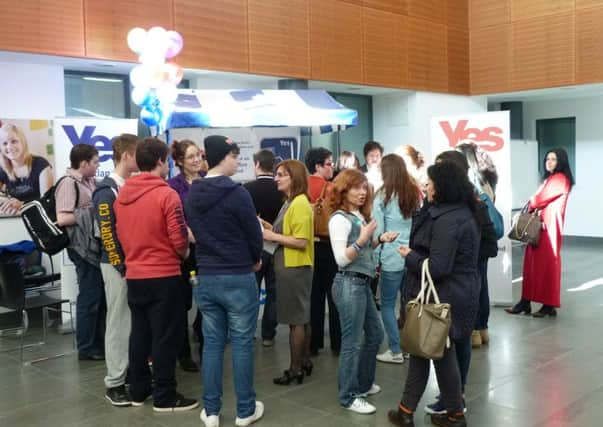Scottish independence: More informed ‘favour Yes’


Research carried out at Edinburgh University found that information contributed to increasing support for independence “when it meets a ‘fertile soil’,” such as those who are more politically active, are already informed about the referendum and are more emotionally involved in the issue of independence.
The study, by visiting academics from the European University Institute (EUI), found that providing more information could “slightly increase the likelihood to vote No” on September 18 - but added this occurred “only in a very few instances”.
Advertisement
Hide AdAdvertisement
Hide AdResearcher Davide Morisi, from the department of political and social sciences at the EUI in Florence, said: “Since independence is related to more uncertainty than keeping the status quo, reading convincing arguments has a stronger effect on a Yes vote, because it contributes to reducing these uncertainties to an ‘acceptable’ level.”
Nearly 300 eligible voters took part in the research, which was carried out at the university’s Behavioural Laboratory in April and May this year.
Before the experiment, 70% of people said they had not decided how to vote in the referendum or could change their mind ahead of the poll on September 18.
But by the end of the test, researchers found that the level of indecision had halved.
Voters were split into groups and given 16 articles about independence - with eight in favour of leaving the UK and eight supporting Scotland staying in the union.
Participants were only allowed to read eight articles, with some groups told to read an even number of pieces on both sides of the debate, while others were allowed to choose which articles to study.
The research found: “Results at the group level confirm that provision of information does affect voting intentions mainly by reducing indecision, especially when individuals are able to select which arguments to read, and by increasing the likelihood to vote Yes, especially when a balanced set of arguments is presented.”
Advertisement
Hide AdAdvertisement
Hide AdThe paper claimed that the “reduction of indecision seems to explain also the specific increase in the likelihood to vote Yes, since the ‘change’ option is the one which carries more uncertainties compared to maintaining the status quo”.
It added: “For this reason, those who are leaning towards voting Yes but are not completely decided are also the ones who benefit more from reading convincing arguments which reduce the uncertainties related to independence.
“With regards to the intentions to vote Yes, information contributes to increasing the support for independence when it meets a ‘fertile soil’, such as in the case of those who are more politically active, more informed about the referendum and more emotionally involved in the issue of independence due to a series of identity factors.
“Information also contributes to slightly increase the likelihood to vote No, but this effect occurs in general only when subjects are able to select the arguments to read and only in a very few instances, such as in the case of those who are close to a pro-union party, those who are less informed about the referendum, and those who care less about the issue of independence.”
SEE ALSO: